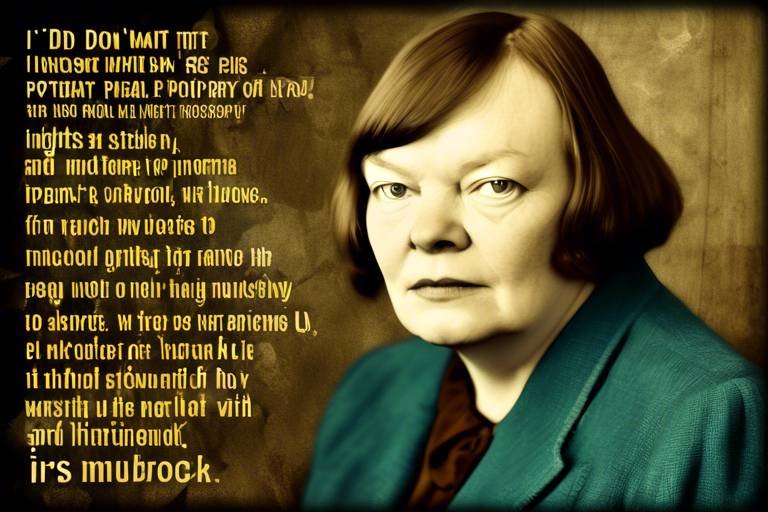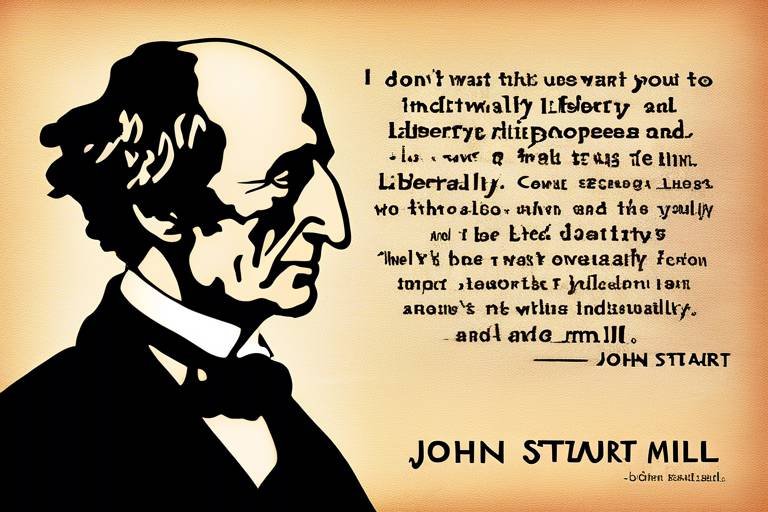Insights into Iris Murdoch's Moral Philosophy
Iris Murdoch, a prominent philosopher and novelist, offers a profound exploration of morality that transcends traditional ethical frameworks. Her moral philosophy is not just a collection of abstract ideas; it is a vibrant tapestry woven from the threads of love, imagination, and the pursuit of the Good. In a world often dominated by self-interest and utilitarian calculations, Murdoch invites us to look beyond mere outcomes and consider the deeper implications of our actions on the lives of others. This article delves into the key concepts of her moral philosophy, illuminating how these ideas can guide us in our daily lives and ethical decision-making.
For Murdoch, goodness is not simply an abstract notion that exists in the ether; it is a tangible reality that shapes our moral landscape. She argues that our understanding of goodness is deeply intertwined with our perceptions and relationships with others. Imagine standing at the edge of a vast ocean, where the waves represent the various moral choices we face. Just as the ocean's depth influences the waves, our connections with others inform our understanding of what is good. In this sense, goodness becomes a guiding star, illuminating our path through the complexities of life.
At the heart of Murdoch's moral philosophy lies the concept of love. She posits that love is not merely an emotion but a fundamental force that transcends self-interest. When we love, we open ourselves to the needs and experiences of others, fostering a deeper understanding of our moral responsibilities. This selfless love encourages us to look beyond our own desires and consider how our actions impact those around us. In a society often marked by individualism, Murdoch's emphasis on love serves as a powerful reminder of our interconnectedness.
Murdoch also highlights the essential role of imagination in achieving moral insight. She believes that imagination allows us to transcend our immediate experiences and consider the broader implications of our actions. It’s like stepping into someone else's shoes and walking around in them for a while. This imaginative exercise enriches our understanding of ethical dilemmas, enabling us to empathize with others and appreciate the complexity of their situations. By nurturing our imaginative capacities, we can enhance our moral reasoning and develop a more profound sense of responsibility toward others.
Gaining different perspectives through imagination is crucial for enriching our moral understanding. When we actively engage with the experiences of others, we can better recognize the nuances of ethical dilemmas. Imagine trying to solve a puzzle without all the pieces; it’s nearly impossible. Similarly, without considering multiple viewpoints, our moral decision-making remains incomplete. Murdoch encourages us to embrace this complexity and acknowledge that every ethical issue has layers that require careful consideration.
According to Murdoch, imagination serves as a vital tool in moral reasoning. It enables us to envision the consequences of our actions and consider the well-being of others. When faced with a moral decision, we can use our imagination to project ourselves into the future and assess how our choices might affect those around us. This forward-thinking approach not only enhances our ethical considerations but also aligns our actions with our values, leading to a more harmonious existence.
Murdoch advocates for selflessness as a means of achieving true moral living. By prioritizing the needs of others over our own desires, we cultivate genuine relationships and contribute positively to society. This selfless approach to morality challenges us to step outside our comfort zones and consider how we can be of service to others. In doing so, we not only enrich our own lives but also foster a sense of community and interconnectedness that is vital for a thriving society.
Murdoch’s moral philosophy is heavily influenced by Platonic ideals, particularly the pursuit of the Good. She interprets this pursuit as an ultimate goal in ethical considerations and human existence. For Murdoch, the Good is not merely a destination but a guiding principle that shapes our moral framework. It encourages us to strive for higher ideals and to seek a deeper understanding of what it means to live a good life.
For Murdoch, the Good is transcendent, representing an ideal that individuals strive toward. This ideal shapes our moral framework and guides our actions in the world. It’s akin to a lighthouse guiding ships through stormy seas—without it, we risk losing our way amidst the chaos of life. By keeping the Good as our focal point, we can navigate the complexities of ethical decision-making with clarity and purpose.
Murdoch critiques utilitarianism for its focus on outcomes rather than intentions. She argues that true morality must consider the depth of human relationships and the purity of one's motives. In her view, a morally sound action cannot be reduced to a mere calculation of benefits and harms; it must also reflect a genuine concern for the well-being of others. This critique highlights the limitations of a purely consequentialist approach to ethics and emphasizes the importance of intention in moral considerations.
Murdoch believes that art plays a crucial role in moral development. Through creative expression, art offers insights into the human condition and allows individuals to explore ethical complexities. Just as a painter uses colors to convey emotions, we can use art to reflect on our moral experiences and engage with the ethical dilemmas we face. This interplay between ethics and art enriches our understanding of morality, inviting us to reflect on our values and the impact of our actions.
- What is the core of Iris Murdoch's moral philosophy? Murdoch emphasizes the importance of love, imagination, and the pursuit of the Good in ethical decision-making.
- How does imagination contribute to moral insight? Imagination allows individuals to see beyond their immediate experiences and consider the broader implications of their actions.
- Why does Murdoch critique utilitarianism? She argues that true morality must consider intentions and the depth of human relationships, not just outcomes.
- What role does art play in Murdoch's philosophy? Art serves as a means to explore ethical complexities and gain insights into the human condition.

The Nature of Goodness
Iris Murdoch's exploration of goodness is nothing short of profound. She argues that goodness is not simply an abstract idea floating in the ether, but rather a concrete reality that profoundly influences our moral decisions and actions. Imagine goodness as a guiding star, illuminating the path we choose to walk. This guiding star is deeply intertwined with our perceptions and relationships with others, shaping how we interact with the world around us.
In Murdoch's view, goodness is a dynamic force that compels us to look beyond ourselves. It encourages us to consider the needs and feelings of others, fostering a sense of connection that transcends mere self-interest. This perspective challenges us to reevaluate our understanding of morality. Are we acting out of self-serving motives, or are we genuinely striving to do good? The essence of goodness, according to Murdoch, lies in our ability to recognize our interconnectedness with others.
One of the most striking aspects of Murdoch's philosophy is her insistence that goodness is not a solitary pursuit. Rather, it is a relational concept, deeply embedded in our interactions with others. When we engage with the world and those around us, we are constantly negotiating our understanding of what it means to be good. This negotiation is not merely an intellectual exercise; it is an emotional and ethical journey that requires us to reflect on our choices and their impact on the lives of others.
Murdoch also highlights the importance of moral vision. She believes that to truly grasp the nature of goodness, we must cultivate a vision that allows us to see beyond our immediate desires and impulses. This vision is not just about recognizing the surface of situations; it involves delving deeper into the moral fabric of our choices and their implications. In this way, goodness becomes a lens through which we can assess our actions and their alignment with a greater ethical purpose.
To summarize, Murdoch's conception of goodness invites us to engage in a transformative process of self-reflection and relational awareness. It challenges us to ask ourselves critical questions: What does it mean to be good in our daily lives? How can we ensure that our actions reflect our commitment to the well-being of others? By embracing these inquiries, we can begin to cultivate a more nuanced understanding of goodness that not only enriches our own lives but also enhances our connections with those around us.
- What is the main idea of Murdoch's philosophy on goodness? Murdoch believes that goodness is a tangible reality that guides our moral actions and is deeply connected to our relationships with others.
- How does Murdoch define the role of love in morality? Love is central to ethical behavior, allowing individuals to connect with others and fostering a deeper understanding of moral responsibilities.
- Why is imagination important in Murdoch's moral philosophy? Imagination helps individuals gain moral insight by allowing them to see the broader implications of their actions on others.

The Role of Love in Morality
In the intricate tapestry of Iris Murdoch's moral philosophy, love emerges as a cornerstone that shapes ethical behavior and decision-making. Murdoch posits that love is not merely an emotion; rather, it is a profound force that transcends self-interest and fosters genuine connections between individuals. When we think about love in this context, it’s akin to the sun illuminating a dark room—it reveals the true nature of our relationships and moral responsibilities, allowing us to see beyond ourselves.
Murdoch argues that love enables us to recognize the needs of others, urging us to act in ways that promote their well-being. This perspective challenges the often self-centered nature of human instincts, suggesting that true morality lies in our ability to prioritize others. Imagine walking through a crowded street; love compels you to notice the elderly person struggling with their groceries or the child who has lost their way. In these moments, love transforms passive observation into active concern, pushing us to engage in ethical actions.
Furthermore, love enriches our understanding of morality by fostering empathy. When we truly love someone, we are motivated to consider their feelings, desires, and struggles. This empathetic engagement allows us to navigate complex moral landscapes, enabling us to make decisions that reflect a deeper understanding of our interconnectedness. Love, therefore, acts as a moral compass, guiding us towards actions that are not only beneficial to ourselves but also to others.
Murdoch's philosophy invites us to reflect on the nature of our relationships and the ethical implications they hold. She emphasizes that love is not just an abstract ideal but a dynamic force that shapes our moral landscape. In her view, love is essential for ethical living because it encourages us to look beyond our immediate interests and consider the broader impact of our actions. This perspective aligns with the idea that morality is not a set of rigid rules but a fluid process shaped by our interactions with others.
In summary, love occupies a central role in Murdoch's moral philosophy, acting as a catalyst for ethical behavior. It challenges us to transcend our self-centered instincts and engage with the world around us in a meaningful way. As we navigate the complexities of life, love provides the clarity and motivation needed to act morally, reminding us that our connections with others are at the heart of what it means to be human.
- What is the main idea of Murdoch's philosophy regarding love?
Murdoch believes that love is essential for ethical behavior, as it allows individuals to connect with others and prioritize their well-being over self-interest. - How does love influence moral decision-making?
Love fosters empathy and understanding, enabling individuals to recognize the needs of others and act in ways that promote their welfare. - Can love be considered a moral compass?
Yes, Murdoch argues that love serves as a moral compass, guiding individuals towards actions that reflect a deeper understanding of their relationships and responsibilities.

Imagination and Moral Insight
When we dive into the world of Iris Murdoch's philosophy, we quickly discover that imagination is not just a whimsical escape; it’s a powerful tool for moral insight. Imagine standing at a crossroads, where every path represents a choice that could impact not just your life but the lives of others around you. Murdoch believes that through the lens of imagination, we can visualize these paths and the potential consequences of our decisions. It’s like being a painter with a blank canvas—each brushstroke represents a choice, and the final image reflects the deeper moral implications of those choices.
Murdoch argues that true moral understanding requires us to look beyond our immediate experiences. It’s about stepping into someone else’s shoes and seeing the world through their eyes. This ability to empathize is crucial in recognizing the complexities of ethical dilemmas. For instance, consider a situation where a friend is in need of support, but helping them might require you to sacrifice your own time and comfort. Here, imagination allows you to ponder not just your feelings but also the emotional landscape of your friend, helping you navigate the moral intricacies of the situation.
Furthermore, Murdoch posits that imagination serves as a vital tool in moral reasoning. By envisioning the consequences of our actions, we can better assess their impact on others. It’s akin to being a chess player, where each move must be calculated not just for personal gain but for the overall game. This perspective encourages us to think critically about our intentions and the broader implications of our actions. When we allow our imagination to flourish, we can cultivate a deeper sense of responsibility towards others, enhancing our moral fabric.
To illustrate the power of imagination in moral insight, let’s consider a few key aspects:
- Empathy: Imagination enables us to connect emotionally with others, fostering a deeper understanding of their struggles and joys.
- Perspective: By imagining different viewpoints, we can appreciate the complexity of ethical dilemmas, leading to more nuanced decisions.
- Consequences: Visualizing the outcomes of our actions helps us align our choices with our moral values, ensuring we act with integrity.
In essence, Murdoch’s emphasis on imagination in moral insight invites us to engage in a more profound exploration of our ethical responsibilities. It challenges us to think critically about our actions and the ways they ripple through the lives of others. Just as a compass guides a traveler through uncharted territory, imagination helps navigate the often murky waters of morality, steering us towards a more compassionate and understanding existence.
- What is the role of imagination in moral decision-making? Imagination allows individuals to visualize the consequences of their actions and empathize with others, enhancing moral understanding.
- How does Murdoch’s philosophy differ from utilitarianism? While utilitarianism focuses on outcomes, Murdoch emphasizes the importance of intentions and the quality of human relationships.
- Can imagination lead to better ethical choices? Yes, by fostering empathy and perspective-taking, imagination can help individuals make more informed and compassionate ethical decisions.

The Importance of Perspective
In the intricate tapestry of moral philosophy, perspective plays an indispensable role. Imagine standing at the edge of a vast canyon, where every step reveals a new view, a different angle of the same breathtaking landscape. This metaphor encapsulates the essence of how perspective influences our moral understanding. Iris Murdoch believed that gaining various perspectives enriches our moral comprehension, allowing us to empathize with others and grasp the complexities of ethical dilemmas. It’s not merely about seeing things from our own vantage point; it’s about stepping into someone else's shoes and experiencing the world through their eyes.
Murdoch argues that the ability to imagine different scenarios and outcomes is crucial for moral reasoning. When we widen our lens and consider alternative viewpoints, we begin to appreciate the nuances of human experiences. This practice fosters a sense of empathy, which is vital in understanding the moral fabric that binds us together. For instance, when facing a moral decision, one might consider:
- How does my choice affect others?
- What are the potential consequences for those involved?
- Am I considering the feelings and perspectives of those impacted?
By engaging with these questions, we don’t just arrive at a decision; we cultivate a deeper awareness of our moral responsibilities. Murdoch’s philosophy encourages us to embrace this complexity rather than shy away from it. In a world that often promotes a singular narrative, it becomes our ethical duty to seek out and understand the multitude of stories that exist around us.
Moreover, this emphasis on perspective is not just an abstract notion; it has practical implications. In social interactions, for example, when we take the time to listen and understand others, we create an environment that nurtures collaboration and respect. This practice can transform conflicts into opportunities for growth and understanding. Thus, the importance of perspective in moral philosophy is not merely academic; it is a call to action, urging us to engage with the world in a more thoughtful and compassionate manner.
In conclusion, embracing diverse perspectives allows us to navigate the moral landscape with greater clarity and empathy. It empowers us to move beyond self-interest and connect with the broader human experience, ultimately leading to more profound ethical insights and relationships. By recognizing the value of perspective, we can contribute to a more harmonious society, grounded in mutual understanding and love.
Frequently Asked Questions
- What is the significance of perspective in moral philosophy?
Perspective allows individuals to empathize with others and consider the complexities of ethical dilemmas, enriching moral understanding. - How can I develop a broader perspective?
Engaging with different viewpoints, listening actively, and reflecting on various experiences can help cultivate a broader perspective. - Why is empathy important in moral decision-making?
Empathy fosters a deeper understanding of others' feelings and experiences, which is crucial for making ethical decisions that consider the well-being of all parties involved.

Imagination as a Moral Tool
When we think about the role of imagination in our moral lives, it's essential to recognize that it serves as a compass guiding us through the murky waters of ethical dilemmas. Iris Murdoch posits that imagination is not merely a tool for creativity; it is a crucial element in understanding our moral responsibilities. Imagine standing at a crossroads, faced with a decision that could impact not just your life but the lives of others. In that moment, the ability to envision the consequences of your actions becomes paramount. This is where imagination shines, allowing us to step outside of our immediate desires and consider the broader implications of our choices.
Murdoch argues that through imagination, we can cultivate a deeper awareness of the human experience. It enables us to visualize the feelings and perspectives of others, helping us to empathize and connect on a more profound level. For instance, when faced with a decision that could harm another, imagination allows us to picture their suffering and the ripple effects of our actions. This empathetic process is not just about feeling sorry for someone; it’s about understanding their reality and recognizing our role in it. Thus, imagination becomes a moral tool that fosters compassion and ethical consideration.
Moreover, imagination encourages us to explore various scenarios and outcomes, enhancing our moral reasoning. It invites us to ask questions such as:
- What if I choose this path instead of that one?
- How will my decision affect those around me?
- Am I acting out of self-interest, or am I genuinely considering the well-being of others?
By engaging with these questions, we can navigate complex moral landscapes more effectively. Murdoch emphasizes that this imaginative engagement is not just about predicting outcomes; it’s about fostering a mindset that values moral insight and the interconnectedness of all individuals. Through this lens, we begin to see that ethical living is not merely a series of rules to follow but a dynamic process that requires active participation and reflection.
In conclusion, imagination, as Murdoch suggests, is more than a passive faculty; it is an active force in moral decision-making. It empowers us to envision the consequences of our actions, enhances our empathy, and ultimately guides us toward a more profound understanding of our ethical responsibilities. When we harness the power of imagination, we become not just better decision-makers but also more compassionate and connected individuals.
- What is the role of imagination in moral philosophy?
Imagination allows individuals to envision the consequences of their actions and helps in understanding the perspectives of others, fostering empathy and ethical decision-making. - How does Iris Murdoch's philosophy relate to selflessness?
Murdoch advocates for selflessness as a means of achieving true moral living, emphasizing that prioritizing the needs of others can lead to genuine relationships and positive societal contributions. - Why is love considered central to Murdoch's moral philosophy?
Love transcends self-interest and enables individuals to connect with others, thereby deepening their understanding of moral responsibilities.

Selflessness and Ethical Living
In the realm of moral philosophy, selflessness emerges as a cornerstone of ethical living according to Iris Murdoch. She argues that true morality is not merely about adhering to rules or achieving personal gain; rather, it is about prioritizing the needs and well-being of others. Imagine a world where individuals actively seek to understand and support one another instead of being caught up in their own desires. This vision is not just idealistic; it is a practical approach to fostering genuine relationships and community.
Murdoch invites us to reflect on our everyday actions and decisions. Are we motivated by self-interest, or do we genuinely care for those around us? The practice of selflessness requires a shift in perspective—seeing beyond our own needs and recognizing the interconnectedness of all people. When we engage in acts of kindness and compassion, we contribute positively to society, creating a ripple effect that can transform lives. It's like throwing a stone into a pond; the ripples spread far beyond the initial point of impact.
Furthermore, selflessness fosters a sense of empathy, allowing us to connect with others on a deeper level. When we prioritize others, we cultivate relationships built on trust and understanding. This is crucial in a world where isolation and disconnection are rampant. Murdoch emphasizes that ethical living is not just about individual actions but about creating an environment where love and care flourish.
To illustrate the importance of selflessness in ethical living, consider the following scenarios:
- A person volunteering at a local shelter, putting aside their own time and comforts to help those in need.
- A friend who listens and offers support during a tough time, prioritizing your feelings over their own agenda.
- A community coming together to support a family facing hardship, demonstrating collective selflessness.
Each of these examples highlights how selflessness can manifest in daily life, revealing the profound impact it can have on our moral landscape. Murdoch’s philosophy encourages us to embrace selflessness not as a sacrifice but as a pathway to a richer, more fulfilling existence. By focusing on the needs of others, we not only enhance their lives but also enrich our own. The act of giving, whether through time, resources, or emotional support, creates a cycle of positivity that benefits everyone involved.
Ultimately, Murdoch’s insights challenge us to rethink our motivations and actions. Are we living ethically? Are we making choices that reflect a commitment to others? By embracing selflessness, we can strive for a life that not only adheres to moral principles but also resonates with love and compassion. This is the essence of ethical living—a continuous journey toward understanding and embodying the greater good.
- What is the main idea of Murdoch's philosophy on selflessness? Murdoch believes that selflessness is essential for ethical living, encouraging individuals to prioritize the needs of others to foster genuine relationships.
- How does selflessness impact relationships? Selflessness enhances relationships by building trust and empathy, allowing individuals to connect on a deeper level.
- Can selflessness lead to personal fulfillment? Yes, by focusing on the well-being of others, individuals often find a greater sense of purpose and fulfillment in their own lives.
- What role does love play in selflessness? Love is a driving force behind selflessness, enabling individuals to act compassionately and ethically toward others.

The Influence of Platonic Thought
Iris Murdoch’s moral philosophy is deeply rooted in the **Platonic tradition**, where the concept of the Good plays a pivotal role. She views the Good not merely as an abstract idea but as a **transcendent reality** that provides a framework for ethical behavior. In this light, the pursuit of the Good becomes a central theme in her moral considerations. Just as Plato sought to understand the essence of goodness through dialogue and philosophical inquiry, Murdoch emphasizes the importance of striving toward this ideal in our daily lives. This pursuit shapes our moral compass and guides our actions in a world that often feels chaotic and morally ambiguous.
Murdoch interprets Platonic ideals through a contemporary lens, arguing that the Good is not only a distant goal but also an **active force** that influences our relationships and decisions. She believes that by focusing on the Good, individuals can transcend their self-centered desires and engage more authentically with the world around them. This engagement fosters a sense of responsibility toward others, encouraging individuals to act with integrity and compassion. In this way, Murdoch’s philosophy aligns with the Platonic view that understanding the Good leads to virtuous living.
Furthermore, Murdoch critiques the modern ethical landscape, particularly the **utilitarian approach**, which often prioritizes outcomes over intentions. In her view, this is a significant departure from Platonic thought, which emphasizes the importance of the **moral agent's motives**. She argues that true morality cannot be reduced to mere calculations of pleasure and pain; rather, it requires a deeper understanding of human relationships and the purity of one's intentions. This perspective invites us to reflect on our motivations and the impact they have on our ethical decisions.
To illustrate the contrast between Platonic ideals and utilitarianism, consider the following table:
| Aspect | Platonic Thought | Utilitarianism |
|---|---|---|
| Focus | Intentions and the pursuit of the Good | Outcomes and consequences |
| Moral Agent | Emphasis on character and virtue | Emphasis on maximizing overall happiness |
| Ethical Decision-Making | Informed by a quest for truth | Informed by calculations of utility |
This table highlights how Murdoch’s interpretation of Platonic thought provides a more profound understanding of morality, urging individuals to look beyond mere outcomes and consider the **ethical implications** of their choices. By embracing this perspective, we can cultivate a richer moral life that values intention, character, and the interconnectedness of human relationships.
In summary, the influence of Platonic thought on Murdoch's moral philosophy underscores the importance of striving for the Good as a way to navigate the complexities of ethical living. It invites us to reflect on our motivations and the impact of our actions on others, ultimately guiding us toward a more meaningful and responsible existence.
- What is the significance of the Good in Murdoch's philosophy?
The Good serves as a transcendent ideal that guides moral actions and fosters authentic relationships. - How does Murdoch critique utilitarianism?
She critiques it for prioritizing outcomes over intentions, emphasizing the need for understanding the depth of human relationships. - What role does imagination play in Murdoch's moral philosophy?
Imagination allows individuals to see beyond their immediate experiences and consider the broader implications of their actions on others.

Transcendence and the Good
When we delve into Iris Murdoch's moral philosophy, one of the most striking elements is her concept of the Good as a transcendent ideal. This notion suggests that the Good is not merely a subjective experience or a fleeting emotion; rather, it represents an ultimate goal that individuals strive to reach throughout their lives. Imagine the Good as a distant star in the night sky, guiding sailors across uncharted waters. Just as sailors rely on the North Star for direction, Murdoch argues that the Good should guide our moral compass, influencing our decisions and actions.
Murdoch draws heavily from Platonic thought, particularly the idea that the Good exists beyond the physical realm. For her, the Good is not confined to the material world; it transcends it, embodying an ideal that we can only aspire to understand. This pursuit of the Good shapes our moral framework, compelling us to look beyond ourselves and our immediate desires. It invites us to consider how our actions resonate with the broader fabric of humanity. In a world often driven by self-interest and immediate gratification, Murdoch's call to recognize the transcendent nature of the Good is both refreshing and challenging.
Moreover, this transcendent Good is not just an abstract idea; it has profound implications for how we live our lives. It encourages us to cultivate virtues such as compassion, honesty, and integrity. By aspiring to these virtues, we align ourselves with the Good, enriching our relationships and enhancing our moral decision-making. In essence, the more we strive toward the Good, the more we elevate our understanding of what it means to live ethically. This pursuit fosters a sense of community, as individuals begin to recognize their interconnectedness and shared responsibilities.
To illustrate Murdoch's view on the Good, consider the following points:
- The Good as a Guiding Principle: It serves as a benchmark against which we can measure our actions and intentions.
- The Role of Intention: Murdoch emphasizes that the purity of our motives is crucial in our moral endeavors.
- Striving for the Good: The journey toward understanding and embodying the Good is ongoing and requires self-reflection and growth.
In summary, Murdoch's concept of the transcendent Good is a cornerstone of her moral philosophy. It challenges us to look beyond our immediate desires and to aspire to a higher moral standard. By doing so, we not only enrich our own lives but also contribute positively to the lives of others. This idea resonates deeply in a world that often prioritizes the tangible over the ideal, urging us to reclaim the importance of ethical aspirations in our daily lives.
- What is the significance of the Good in Iris Murdoch's philosophy?
Murdoch views the Good as a transcendent ideal that guides our moral actions and decisions, encouraging individuals to strive for higher ethical standards. - How does Murdoch's idea of the Good differ from other ethical theories?
Unlike utilitarianism, which focuses on outcomes, Murdoch emphasizes the importance of intentions and the purity of motives in moral considerations. - Why is imagination important in Murdoch's moral philosophy?
Imagination allows individuals to see beyond their immediate experiences, fostering empathy and a deeper understanding of the implications of their actions on others.

Critique of Utilitarianism
Iris Murdoch's critique of utilitarianism is a profound exploration of the limitations inherent in this ethical framework. At its core, utilitarianism advocates for actions that maximize overall happiness or utility, often reducing moral complexity to a simple equation of pleasure versus pain. Murdoch, however, argues that this approach is fundamentally flawed because it overlooks the richness of human relationships and the significance of intent behind actions. She posits that morality is not merely about outcomes but also about the depth of our connections with others and the purity of our motives.
One of the critical points Murdoch raises is that utilitarianism tends to promote a form of ethical calculation that can lead to a cold, mechanical view of human life. By prioritizing the greatest good for the greatest number, it risks sacrificing the individual for the sake of the collective. This perspective can be particularly dangerous, as it may justify harmful actions against a minority if those actions lead to a net increase in happiness for the majority. In this way, utilitarianism can inadvertently endorse a form of moral blindness that fails to recognize the intrinsic value of each person.
Moreover, Murdoch emphasizes the importance of intentions in moral reasoning. She believes that understanding why we act is just as crucial as understanding the consequences of our actions. This focus on intent invites us to consider questions like: Are we acting out of love and compassion, or are we simply calculating the most beneficial outcome? In her view, true morality is rooted in selflessness and the capacity to empathize with others, which utilitarianism often neglects.
To illustrate her critique, Murdoch contrasts utilitarianism with a more nuanced ethical approach that incorporates the complexities of human emotions and relationships. She argues that a moral framework should allow for the rich tapestry of human experience, which includes love, sacrifice, and the often messy nature of interpersonal connections. This perspective aligns more closely with her belief in the importance of imagination in ethical decision-making, as it encourages individuals to envision the broader implications of their actions on others.
In summary, Murdoch's critique of utilitarianism serves as a reminder that morality is not merely a numbers game. Instead, it’s a deeply personal journey that requires us to reflect on our intentions and the impact of our actions on the lives of others. By focusing on relationships and the moral significance of our choices, we can cultivate a more compassionate and holistic understanding of ethics that resonates with the complexities of the human condition.
- What is utilitarianism? Utilitarianism is an ethical theory that suggests that the best action is the one that maximizes overall happiness or utility.
- Why does Iris Murdoch critique utilitarianism? Murdoch critiques utilitarianism for its focus on outcomes rather than intentions, arguing that it neglects the depth of human relationships and the moral significance of our motives.
- How does Murdoch view the role of love in morality? Murdoch sees love as central to ethical behavior, enabling individuals to connect with others and understand their moral responsibilities.
- What is the importance of imagination in Murdoch's philosophy? Imagination allows individuals to see beyond their immediate experiences, helping them to empathize with others and consider the broader implications of their actions.

The Interplay of Ethics and Art
When we think about art, we often imagine beautiful paintings, moving melodies, or captivating performances. But what if I told you that art is not just about aesthetics? According to Iris Murdoch, art serves as a profound medium through which we can explore the complexities of morality. Imagine art as a mirror reflecting the depths of the human experience, revealing not just our joys but also our ethical dilemmas. In her view, the connection between ethics and art is not merely incidental; it's intrinsic.
Murdoch believed that engaging with art allows individuals to delve into the nuances of ethical decision-making. Through the lens of a novel, a painting, or a symphony, we can experience the moral struggles of characters or the emotional weight of a situation. This engagement fosters a deeper understanding of not only our own moral compass but also the ethical challenges faced by others. By immersing ourselves in artistic expressions, we develop empathy—an essential component of moral reasoning.
Furthermore, art challenges us to confront uncomfortable truths. It has the power to provoke thought and evoke feelings that might otherwise remain dormant. For instance, consider how a powerful film can shed light on social injustices, prompting viewers to question their own beliefs and actions. In this way, art acts as a catalyst for moral reflection, encouraging us to examine our values and the implications of our choices.
Murdoch's perspective on the interplay between ethics and art can be summarized as follows:
- Art as a Moral Teacher: Artistic works can educate us about ethical complexities, illustrating the consequences of our actions and the importance of understanding diverse viewpoints.
- Emotional Engagement: Art evokes emotions that lead to deeper connections with moral issues, allowing us to feel what others experience.
- Reflection and Introspection: Engaging with art prompts us to reflect on our own lives and moral decisions, often leading to personal growth.
Moreover, Murdoch posits that art provides a space for imagination, which is crucial for moral insight. Through imaginative engagement with art, we can envision various outcomes of our actions and grapple with the ethical implications they carry. This imaginative process allows us to step into the shoes of others, fostering a sense of connection and responsibility. In a world that often feels chaotic and disconnected, art serves as a bridge, linking us to our shared humanity.
In conclusion, the interplay of ethics and art is a dynamic relationship that enriches our understanding of morality. Murdoch's insights remind us that art is not just a form of entertainment; it is a vital tool for ethical exploration. By engaging with art, we can cultivate a more profound sense of empathy, challenge our preconceptions, and ultimately strive for a more ethical existence. So, the next time you find yourself lost in a piece of art, remember: you are not just viewing beauty; you are participating in a moral dialogue that has the potential to transform your understanding of the world.
- How does art influence our moral decisions? Art influences our moral decisions by allowing us to empathize with others' experiences, prompting us to reflect on our values and the consequences of our actions.
- Can art be a form of activism? Absolutely! Art can serve as a powerful tool for activism, raising awareness about social issues and inspiring change through emotional engagement and moral reflection.
- What role does imagination play in understanding ethics through art? Imagination enables us to visualize different perspectives and outcomes, enriching our moral insight and helping us navigate complex ethical dilemmas.
Frequently Asked Questions
- What is the main focus of Iris Murdoch's moral philosophy?
Iris Murdoch's moral philosophy primarily emphasizes the nature of goodness, love, and the role of imagination in ethical decision-making. She believes that goodness is a tangible reality that influences our moral actions and relationships with others.
- How does Murdoch define goodness?
Murdoch defines goodness as a concrete reality rather than an abstract concept. She argues that it is deeply connected to our perceptions and interactions with others, guiding our moral choices and actions.
- Why is love considered central to Murdoch's ethical framework?
In Murdoch's view, love transcends self-interest and is essential for ethical behavior. It fosters connections with others and deepens our understanding of moral responsibilities, allowing us to prioritize the well-being of those around us.
- What role does imagination play in moral insight according to Murdoch?
Murdoch posits that imagination is crucial for moral insight as it enables individuals to look beyond their immediate experiences. It helps them to consider the broader implications of their actions on others, enriching their ethical understanding.
- How does Murdoch's philosophy critique utilitarianism?
Murdoch critiques utilitarianism for its focus on outcomes rather than intentions. She argues that true morality must take into account the depth of human relationships and the purity of one's motives, rather than merely aiming for the greatest good for the greatest number.
- In what way does art contribute to moral development in Murdoch's philosophy?
Murdoch believes that art is vital for moral development as it provides insights into the human condition. Through creative expression, individuals can explore ethical complexities and deepen their understanding of moral dilemmas.
- What influence does Platonic thought have on Murdoch's moral philosophy?
Murdoch's moral philosophy is heavily influenced by Platonic ideals, particularly the pursuit of the Good. She interprets the Good as a transcendent ideal that shapes moral frameworks and guides human actions in the quest for ethical living.
- How does selflessness relate to ethical living in Murdoch's view?
Murdoch advocates for selflessness as a pathway to true moral living. By prioritizing the needs of others, individuals can cultivate genuine relationships and contribute positively to society, reflecting her belief in the interconnectedness of human experiences.



















